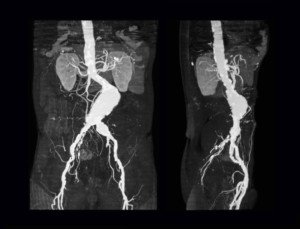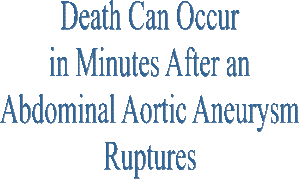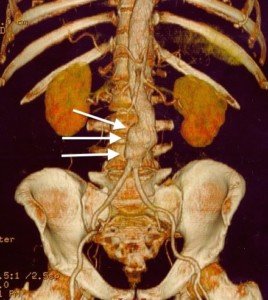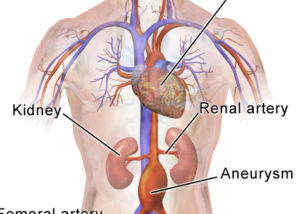
If you can feel a pulse in your stomach, this can mean a life-threatening condition involving a major blood vessel that runs down your abdomen or a cancerous tumor.
The first condition is called abdominal aortic aneurysm. An aneurysm is a weakening in the wall of an artery – and in this case, the abdominal aorta.
Over time, especially if you have high blood pressure, the aneurysm will likely increase in size, and as it does so, the arterial wall thins – and gets weaker.

The bulge below the kidneys is an aneurysm; front and side view. Shutterstock/Suttha Burawonk
If it gets too thin, there will be a high risk of rupture or dissection, causing immediate internal hemorrhaging.

A person can have an AAA for years and not know it because typically this condition does not cause symptoms.
Usually it’s discovered by accident when the patient undergoes stomach imaging for an unrelated concern.
However, a savvy patient who feels a pulse in their stomach will seek medical attention.
The pulsating will usually be near the belly button.
“Top of that list for this symptom [pulse in stomach] is an aneurysm (ballooning out) of a major abdominal blood vessel that is threatening to rupture,” says David D. Clarke, MD, President, Psychophysiologic Disorders Association (stressillness.com), Clinical Assistant Professor of Gastroenterology Emeritus, Oregon Health & Science University, and author of “They Can’t Find Anything Wrong.”
Dr. Clarke specializes in physical symptoms that result from stress.
“This can sometimes cause back or abdominal pain and would need emergency surgery,” continues Dr. Clarke.
Sudden severe stomach or back pain means a trip to the ER – especially if you’ve been experiencing a pulsating sensation in your stomach.
Risk Factors for Abdominal Aortic Aneurysm
• Smoking history (especially in males 65 to 75)
• High blood pressure
• Hardening of the arteries
• Aortic infection (rare risk)
• Family history of aneurysm or heredity
• Abdominal trauma such as from a car accident
• Blood vessel disease
• Being over 65 even if you’ve never smoked
• Women who’ve never smoked usually don’t need screenings for AAA, but this doesn’t mean you shouldn’t see a doctor if you’re worried about a pulse in your stomach.
• Screenings are done via ultrasound.

Abdominal Aortic Aneurysm. Credit: Bakerstmd
Sometimes when an aneurysm is discovered by accident, a doctor may decide on just serial surveillance to monitor its growth.
But if the ballooning is big enough, even if the only symptom is the pulse in one’s stomach, surgery will be in order.
Strength of the Pulse in Your Stomach
The stronger or more “throbbing” it is, the more likely that it’s an aneurysm. However, this is not a diagnostic criterion.
Only an imaging study (which may include CT and MRI) can provide a proper diagnosis.
If the weakened arterial wall indeed is causing this symptom, you may feel it more when lying on your back.
A “heartbeat” in your stomach may also become more prominent after physical activity.
Usually, the pulse from an abdominal aortic aneurysm will be in synch with your heartbeat.
However, Dr. Clarke explains, “I can still imagine a situation where the arterial pulse is delayed enough by whatever pathology is present that it throws off the synchrony, so I would still want to see the CT scan.”
Cancer As a Cause of a Stomach Pulse
“Next on the list of possibilities would be a tumor (malignant or benign), abscess or other inflamed mass or an enlarged organ sitting close enough to a major blood vessel that it is affected by the arterial pulsations,” says Dr. Clarke.
“These, too, could cause back or abdominal pain. A large fraction of situations like either of these [AAA or some kind of mass] would be detected with physical examination of the abdomen.
“An abdominal CT scan would detect anything like this that physical exam could not.
“For pulsation not in sync with the heartbeat, these possibilities are less likely,” but again, the pulse can be delayed or out of synch in the case of serious disease.
Dr. Clarke adds, “If I can’t feel what is pulsing on exam and the abdominal CT scan showed nothing significant, then serious problems are highly unlikely.”
Other Causes of a “Heartbeat” in the Stomach
When imaging rules out an AAA, cancer or other mass, “the most likely cause is rhythmic contractions of the stomach or large intestine, more likely the latter and typically these would be slower than the heartbeat and not in sync with it,” explains Dr. Clarke.
“If this was accompanied by nausea and vomiting there could be a partial or complete obstruction of the GI tract.
“If there was no nausea or vomiting then the pulsation is likely linked to a form of irritable bowel syndrome which can fluctuate in response to stress or anxiety in many people.”
Pulse in Stomach: When to See Doctor
– If you’re worried.
– If it’s strong.
– If there are other symptoms along with it.
– If you have any of the above risk factors for an abdominal aortic aneurysm.
Dr. Clarke says, “Many uncommon or rare phenomena could conceivably present themselves with this symptom [pulse in stomach] in some circumstances.
“I’m just trying to mention the most likely.”



























